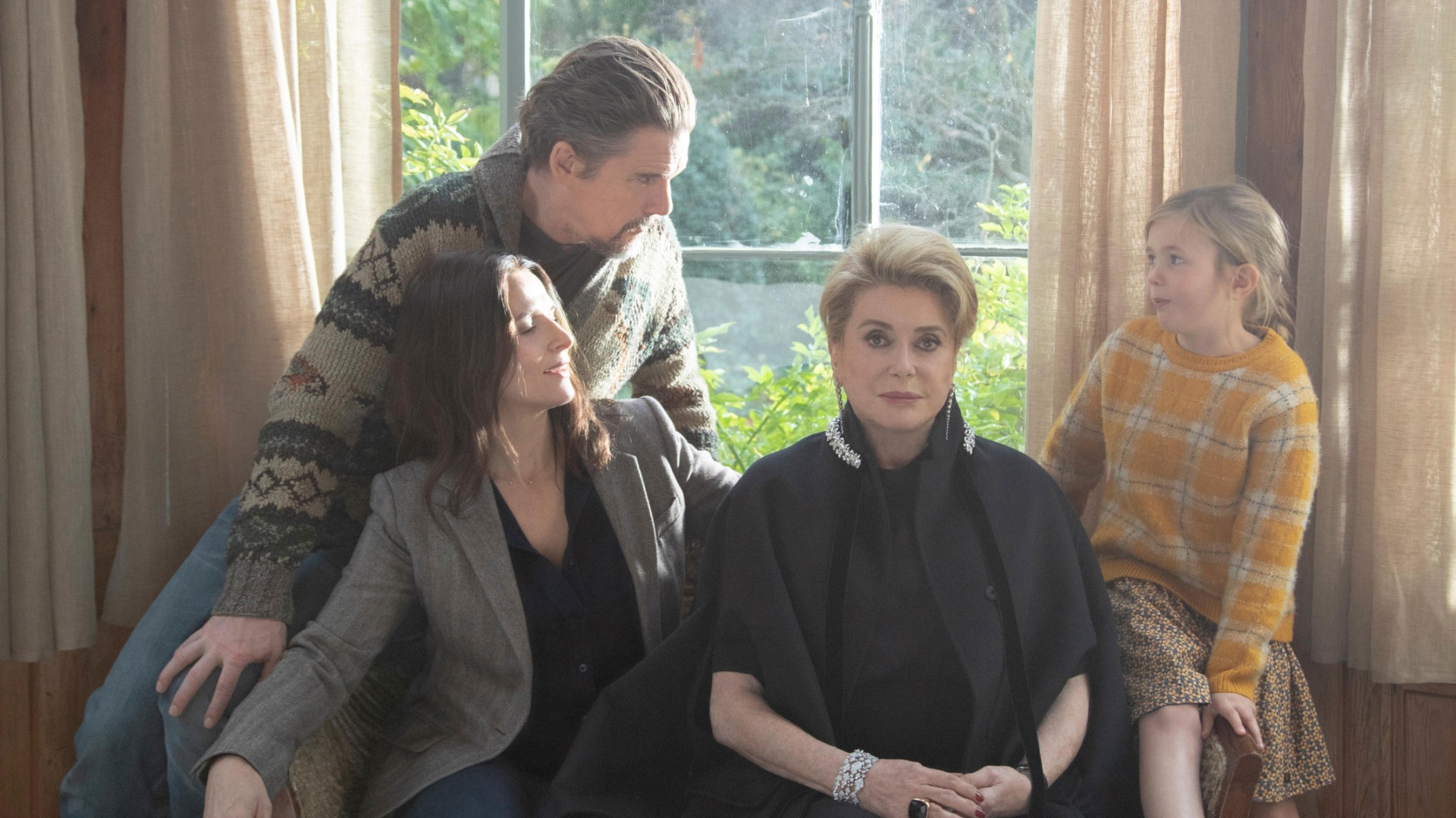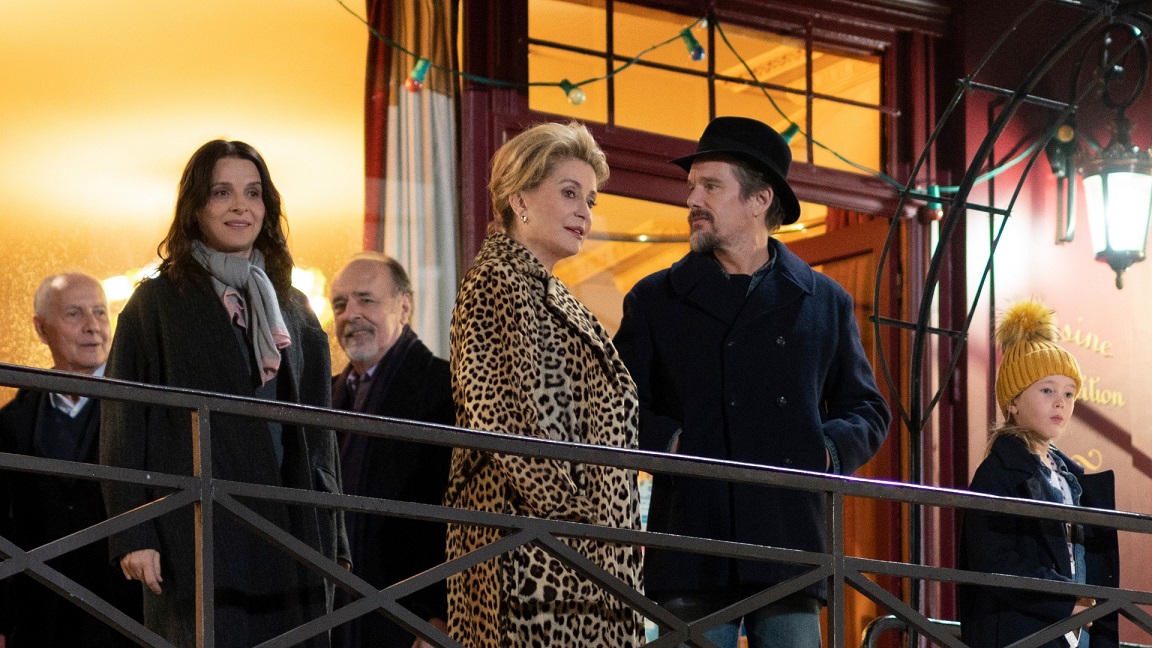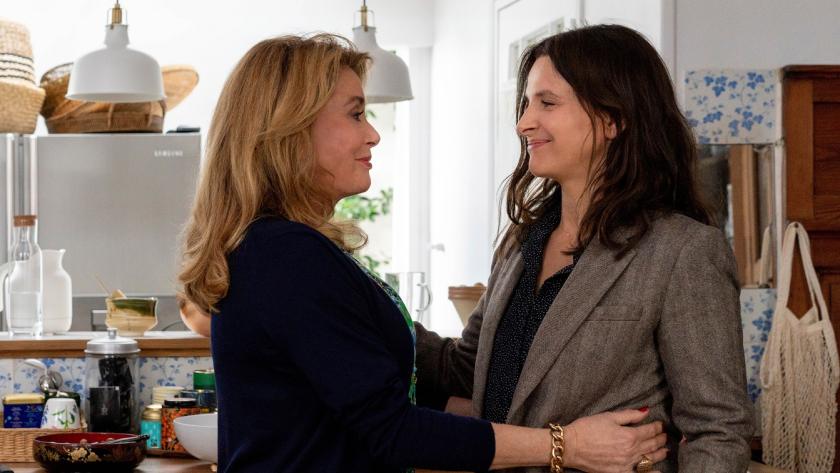It may offer veteran French star Catherine Deneuve as substantial and engaging a role as she has enjoyed in years, but the real surprise of The Truth is that it’s the work of Japan’s Hirokazu Kore-eda. The director, whose Shoplifters took the Palme d’Or at Cannes two years ago, has made a distinctive move away from his native environment – and, no less importantly, language: apart from a few scenes played in English, this is a French-language piece – in a film that catches the tone and nuances of French cinema with a finesse that’s as delightful as it is convincing.
Occasionally it feels almost parodically français, even – or rather, more politely put, it comes with a generous dose of self-irony, one that’s exemplified by Deneuve’s rollickingly self-referential performance as Fabienne Dangeville, a screen diva of a certain vintage whose status lets her get away with a great deal: loyal retainers like Alain Libolt’s longsuffering Luc (a wonderful cameo), not to mention partners past (Roger Van Hool, another delightfully brief appearance) and present, are at her haughty beck and call. As well as that, there’s a quintessentially French filmic prosperity to the mansion, complete with enormous garden, that is her home in the Paris suburbs: it’s a world as far removed from the deprivation of Shoplifters as it is from the more modest family dramas, such as 2013’s Like Father, Like Son (another winner at Cannes), for which Kore-eda remains best known. However, The Truth does reveal thematic consistency (albeit in new ways) in its exploration of Kore-eda’s key theme, the dynamics of parent-child relationships: its central interaction is between Deneuve’s Fabienne and her screenwriter daughter Lumir (Juliette Binoche, slightly subdued but nevertheless a smouldering presence), who’s visiting from New York with her American actor husband (Ethan Hawke, showing considerable skill in playing sotto voce) and their endearingly innocent young daughter Charlotte (Clémentine Grenier; the family group, pictured above) to celebrate the publication of maman’s memoirs. Although that book shares the title of Kore-eda’s film, Lumir quickly discovers it’s anything but: when she upbraids her mother for falsifying the past, Fabienne’s response is typically uncompromising, “I'm an actress, I won't tell the unvarnished truth.”
However, The Truth does reveal thematic consistency (albeit in new ways) in its exploration of Kore-eda’s key theme, the dynamics of parent-child relationships: its central interaction is between Deneuve’s Fabienne and her screenwriter daughter Lumir (Juliette Binoche, slightly subdued but nevertheless a smouldering presence), who’s visiting from New York with her American actor husband (Ethan Hawke, showing considerable skill in playing sotto voce) and their endearingly innocent young daughter Charlotte (Clémentine Grenier; the family group, pictured above) to celebrate the publication of maman’s memoirs. Although that book shares the title of Kore-eda’s film, Lumir quickly discovers it’s anything but: when she upbraids her mother for falsifying the past, Fabienne’s response is typically uncompromising, “I'm an actress, I won't tell the unvarnished truth.”
Given that the new film on which Fabienne is working is called “Memories of My Mother”, it’s clear that a complicated web of secrets and lies is being spun: it’s an eccentric sci-fi yarn (based on Ken Liu’s 2012 flash fiction piece) that has the ageing Deneuve-Fabienne playing daughter to her preternaturaly youthful mother (she lives most of the time in space, so doesn't age). Preposterous, yes, and the referencing of mother-daughter connections between film-within-film and immediate narrative is further complicated by the fact that the actress playing that fictional maternal role (Manon Clavel) is acclaimed as being the natural successor to another French screen legend, now deceased, who was in her time both best friend and rival to Fabienne, as well as something of a substitute mother to Lumir.
Kore-eda appears as much concerned with the lighter, 'non-essential' details of life, its winning eccentricities
Kore-eda gives us visits to the film set that are rich in humour, liberal doses of thespian cattiness included. Such lighter elements, which certainly reference the realities of French cinema history – Deneuve gets to deliver some put-downs that could almost be out of her real-life career – co-exist with a gentler, more profound sense of the complexities of life. There are moments when Fabienne seems uncompromisingly cold, selfishly detached – “I’d prefer to be a bad mother, a bad friend, but a great actress,” she defends herself at one point – but as The Truth’s reserves of feeling reveal themselves, its emotions become somehow more absorbing, and later scenes between Deneuve and Binoche have undeniable power.
Beyond the complexity of that rather more weighted strand, however, Kore-eda appears as much concerned with the lighter, “non-essential” details of life, its winning eccentricities, in a way that surely recalls the work of another "outsider" director, Otar Iosseliani, who has made a career of capturing the unpredictable textures of French life. Originally from Soviet Georgia, Iosseliani came to Paris in the 1980s and for more than three decades now has been making films like Adieu, plancher des vaches! and La chasse aux papillons that engage with the whimsicality of circumstance and character in a way that is simply deletcable. There are moments in The Truth when Kore-eda could almost be paying homage to his antecedent cinematic crosser-of-borders. And any such relocation across film cultures, when successful, is no small achievement in itself. However much cinema may be an international business, the list of directors who can be said to have seamlessly absorbed themselves into a different culture from that wiht which they started is surely short: more often than not, the resulting work loses the acuity of the original context without acquiring any corresponding new value from the replacement one. (Or the move is into the universal English language, often but not always towards Hollywood, where the lure is commercial.) In Kore-eda’s case, it was apparently inspired by Binoche, who has made a point of working with auteurs from outside France, from locations as geographically varied as Iran (Abbas Kiarostami) and Taiwan (Hou Hsiao-Hsien).
And any such relocation across film cultures, when successful, is no small achievement in itself. However much cinema may be an international business, the list of directors who can be said to have seamlessly absorbed themselves into a different culture from that wiht which they started is surely short: more often than not, the resulting work loses the acuity of the original context without acquiring any corresponding new value from the replacement one. (Or the move is into the universal English language, often but not always towards Hollywood, where the lure is commercial.) In Kore-eda’s case, it was apparently inspired by Binoche, who has made a point of working with auteurs from outside France, from locations as geographically varied as Iran (Abbas Kiarostami) and Taiwan (Hou Hsiao-Hsien).
Working with a French crew – and paying tribute, not least, to the talents of his translator – Kore-eda has pulled off the challenge he set himself, with the Gallic charm here as redolent as Eric Gautier’s cinematography is luxuriant. The Truth is an unusual, unexpected treat: whether it proves a one-off experiment or the start of a new course for the director remains to be seen, but the sense of Kore-eda flexing new filmic muscles feels as beguiling as it is invigorating.
Watch the trailer for The Truth















Add comment